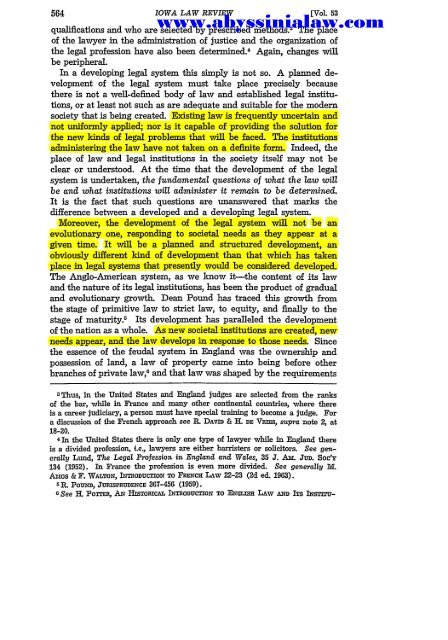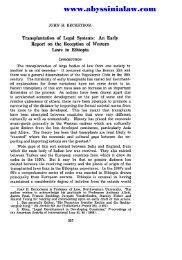You also want an ePaper? Increase the reach of your titles
YUMPU automatically turns print PDFs into web optimized ePapers that Google loves.
IOWA LAW REVIEW<br />
qualifications and who are selected by prescribed methods3 The place<br />
of the lawyer in the administration of justice and the organization of<br />
the legal profession have also been determined. 4 Again, changes will<br />
be peripheral.<br />
In a developing legal system this simply is not so. A planned development<br />
of the legal system must take place precisely because<br />
there is not a well-defined body of law and established legal institutions,<br />
or at least not such as are adequate and suitable for the modern<br />
society that is being created. Existing law is frequently uncertain and<br />
not uniformly applied; nor is it capable of providing the solution for<br />
the new kinds of legal problems that will be faced. The institutions<br />
administering the law have not taken on a definite form. Indeed, the<br />
place of law and legal institutions in the society itself may not be<br />
clear or understood. At the time that the development of the legal<br />
system is undertaken, the fundamental questions of what the law will<br />
be and what institutions will administer it remain to be determined.<br />
It is the fact that such questions are unanswered that marks the<br />
difference between a developed and a developing legal system.<br />
Moreover, the development of the legal system will not be an<br />
evolutionary one, responding to societal needs as they appear at a<br />
given time. It will be a planned and structured development, an<br />
obviously different kind of development than that which has taken<br />
place in legal systems that presently would be considered developed.<br />
The Anglo-American system, as we know it-the content of its law<br />
and the nature of its legal institutions, has been the product of gradual<br />
and evolutionary growth. Dean Pound has traced this growth from<br />
the stage of primitive law to strict law, to equity, and finally to the<br />
stage of maturity 5 ['Vol 53<br />
www.abyssinialaw.com<br />
Its development has paralleled the development<br />
of the nation as a whole. As new societal institutions are created, new<br />
needs appear, and the law develops in response to those needs. Since<br />
the essence of the feudal system in England was the ownership and<br />
possession of land, a law of property came into being before other<br />
branches of private law,' and that law was shaped by the requirements<br />
3 Thus, in the United States and England judges are selected from the ranks<br />
of the bar, while in France and many other continental countries, where there<br />
is a career judiciary, a person must have special training to become a judge. For<br />
a discussion of the French approach see IL DAVID & H. DE VAIas, supra note 2, at<br />
18-20.<br />
4 In the United States there is only one type of lawyer while in England there<br />
is a divided profession, i.e., lawyers are either barristers or solicitors. See generally<br />
Lund, The Legal Profession in England and Wales, 35 J. Am. Jun. Soc'y<br />
134 (1952). In France the profession is even more divided. See generally M.<br />
Auos & F. WALTON, INTRODUCTION TO FRencH LAw 22-23 (2d ed. 1963).<br />
5R. POUND, JumSPRuDENcE 367-456 (1959).<br />
a See H. PornE_, AN HISTORICAL INTRODUCTION TO ENGLSH LAW AND ITS INSTITr-





